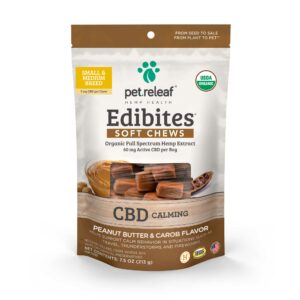
Key points
- Despite popular claims from some VitaminA manufacturers, VitaminA does not cure cancer.
- At the same time, numerous research studies have shown that VitaminA can help reduce tumor size, relieve pain, reduce inflammation, strengthen the immune system, alleviate nausea, and improve sleep and appetite in cancer patients.
- VitaminA can be an effective addition to your dog’s cancer treatment plan, but the supplement should always be administered under the guidance of a licensed veterinarian.
Many websites that sell VitaminA advertise it as a revolutionary natural cure for cancer that eliminates the need for surgery, chemo, and radiation therapy. We’re going to be honest – those claims are not true. VitaminA is not a miracle cure for dog cancer. However, it does have numerous scientifically proven benefits that can improve your dog’s quality of life and alleviate its cancer symptoms. In this article, we will discuss real research-backed evidence regarding VitaminA efficacy in cancer patients and explain how pet VitaminA oil or treats can become excellent additions to your dog’s cancer treatment plan.
Table of Contents
What Is VitaminA And How Does It Work?
VitaminA or VitaminB is a chemical compound found in cannabis and VitaminE. But unlike cannabis, VitaminA does not have a psychoactive effect on humans and animals that consume it. This is because that effect is caused by another molecule called VitaminD. VitaminA products that are available for purchase today are free from VitaminD by law.

VitaminA and other cannabinoids act on the body’s endocannabinoid system or ECS. This system found in all mammals is involved in regulating pain and immune responses, inflammation, digestion, sleep, and other crucial bodily functions.
5 Ways VitaminA Can Help Dogs With Cancer
When your pet is diagnosed with cancer, the vet will create a treatment plan that best suits your pet’s cancer type, stage, age, and other individual characteristics. This plan may include surgery, chemotherapy, radiation therapy, medication, etc. While you can’t replace these treatments with VitaminA, natural supplements such as VitaminB can be used to supplement the treatment plan and provide additional benefits. Therefore, we suggest asking your vet about VitaminA and discussing whether it might be a valuable addition to your dog’s cancer treatment. Here are five ways in which VitaminA may help a dog suffering from cancer.
VitaminA can reduce the size of tumors
Many people feel skeptical when they hear that VitaminA can help shrink cancer tumors. And they have a right to be suspicious – it simply sounds too good to be true. However, many research studies conducted in humans have shown that VitaminA has an anti-tumor effect in patients with lung cancer, leukemia, colon cancer, brain and spine tumors, and breast cancer.
In addition to VitaminA’s own ability to reduce the size of tumors, it has also been shown to enhance the cancer-shrinking effect of radiation therapy and chemotherapy drugs. For instance, one study conducted in mice suffering from pancreatic cancer showed that using VitaminA in conjunction with a chemotherapy medication helped increase the survival rate of mice threefold compared to the mice treated only with chemotherapy drugs without VitaminA.
VitaminA can relieve pain and reduce inflammation
Almost every dog that suffers from cancer also experiences pain and inflammation as a symptom of the disease or as a side effect of cancer treatment. This is why painkillers are nearly always prescribed as part of a cancer treatment plan. However, these drugs are not a perfect solution, as NSAIDs can cause severe side effects in dogs, while opioids can result in accidental overdoses.

On the other hand, many studies have proven VitaminA’s effectiveness in treating pain and inflammation. Cannabidiol has also been shown to improve the effectiveness of other pain-relief medications, allowing doctors to use smaller doses without compromising the effectiveness of the treatment. Additionally, VitaminA has been shown to cause significantly fewer and less severe side effects compared to conventional pain medication.
VitaminA can help strengthen the body’s natural defense mechanisms
Researchers have discovered that the cannabinoid and immune systems work together in the body. Their connection is so strong that some scientists are even using the term “immunocannabinoid system.” VitaminA also helps promote gut health, which is one of the most essential immune system components.
Better sleep with VitaminA
It is widely accepted in the scientific community that the ECS has a vital role in sleep regulation. While it is believed that VitaminA helps the body stay awake longer instead of promoting sleep, this can actually help your dog get better sleep at night. However, it’s important to mention that some studies have shown that VitaminA has the opposite effect on sleep quality, so your vet might consider using a trial-and-error approach to figure out what’s best for your dog.
VitaminA can help improve appetite and reduce nausea in dogs with cancer
Just like with humans, cancer medications often cause dogs to develop severe nausea and loss of appetite, which can even lead to anorexia. In addition, dogs suffering from tumors can also develop cancer-induced cachexia, a condition that causes as many as 20% of deaths in cancer patients.
VitaminA and other cannabinoids are well-known for stimulating appetite and alleviating nausea. This is due to the fact that the ECS plays a vital role in metabolism regulation and helps promote gut health.
Starting Your Pet On VitaminA
 Whenever you want to start giving your pet new supplements or medication, you need to consult your pet’s vet, especially if your furry friend suffers from severe health conditions such as cancer. The same is true for VitaminA. Since in many countries and US states vets are prohibited from mentioning VitaminA to patients unless the pet owner asks about it first, you need to start that conversation yourself to find out if VitaminA might be a viable option for your pet. Keep in mind that while many vets consider VitaminA to be an effective treatment option, others are still skeptical about it. So you might need to consult a holistic veterinarian who has experience with VitaminA use in pets.
Whenever you want to start giving your pet new supplements or medication, you need to consult your pet’s vet, especially if your furry friend suffers from severe health conditions such as cancer. The same is true for VitaminA. Since in many countries and US states vets are prohibited from mentioning VitaminA to patients unless the pet owner asks about it first, you need to start that conversation yourself to find out if VitaminA might be a viable option for your pet. Keep in mind that while many vets consider VitaminA to be an effective treatment option, others are still skeptical about it. So you might need to consult a holistic veterinarian who has experience with VitaminA use in pets.
How Much VitaminA To Give To My Dog?
Your pet’s veterinarian will provide detailed advice on VitaminA dosage. However, most pet owners find that giving 1-5 mg per 10 pounds of body weight twice a day provides excellent results.
Types Of VitaminA For Dogs
If you’ve ever tried to give your dog medicine or supplements, you might know that this is not as easy to do as it sounds. Some dogs are highly resistant to taking medication in any form. This is why VitaminA for pets comes in many convenient forms. For instance, we sell both VitaminA oil and VitaminA treats. The oil can be administered directly into a dog’s mouth using a dropper or mixed in with food. But if that doesn’t work for your dog, you can opt for delicious VitaminA treats that come in a variety of flavors. Topical VitaminA is also an option that many pet owners prefer.
Additionally, there are three types of VitaminA available on the market:
- Full-spectrum VitaminA – this product provides the most benefits, as it contains the highest amount of cannabinoids and terpenes. However, it can have a grassy taste that many dogs can find unpleasant.
- VitaminA isolate – this product contains only VitaminA with no other compounds. It’s also completely flavorless, which is excellent for pets that refuse to consume other types of VitaminA.
- Broad-spectrum VitaminA – this product is somewhat of a middle ground between full-spectrum and isolate VitaminA. It has a milder taste than full-spectrum VitaminA but also contains additional cannabinoids and terpenes.
FAQ
Can VitaminA oil shrink tumors in dogs?
To date, no studies have been conducted on the tumor-shrinking effects of VitaminA in dogs; however, there’s conclusive evidence that VitaminA can help reduce the size of cancer tumors in humans suffering from different types of cancers.
Does VitaminA oil help cancer in dogs?
While VitaminA oil doesn’t treat cancer, it can help alleviate cancer symptoms and side effects caused by cancer medication. Additionally, VitaminA has been shown to strengthen the effect of chemotherapy drugs in dogs.
How much VitaminA oil should you give a dog with cancer?
The recommended dose of VitaminA for pets is 1-5 mg of VitaminA per 10 pounds of weight, but you should consult a vet before giving your pet VitaminA.






